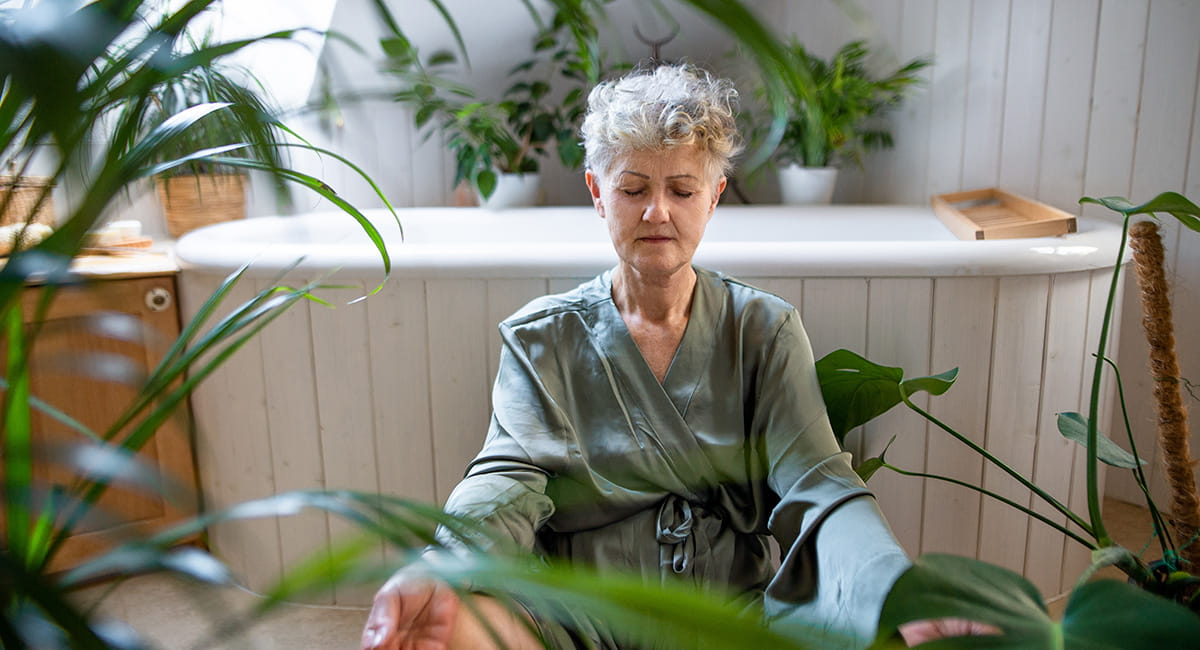“Be aware of what your triggers are and your early warning signs. Plan what to do if your mental health changes.”— Dr Laura Kampel, Head of Clinical Services, Black Dog Institute
Key points
- Mental health issues are becoming more prevalent across the globe. In Australia, around a quarter of Australians aged 16–85 experienced a mental health condition in 2020–21.
- Risk factors for a mental health condition can include genetics, experiencing a stressful life event, unhealthy habits, or drug and alcohol use.
- Getting back the basics of good health—like prioritising sleep, engaging in a healthy lifestyle and maintaining positive relationships—can help you safeguard your wellbeing.
- If you’re struggling with your mental health, your GP can help you organise a mental health plan.
How are you?...
All polite chit-chat aside, how are you really?

It’s a question worthy of serious consideration at a time when the Secretary-General of the United Nations has stated that: "We are living through a global mental health crisis."
How we collectively got here is open to debate. Do you blame it on the impact of COVID-19, the spiralling cost of living, or the invidious effects of social media? Whatever your personal take, the current scenario is cause for genuine concern.
At a local level, the figures in Australia are not encouraging. The National Survey of Mental Health and Wellbeing revealed that in 2020–21 almost a quarter of Australians aged 16–85 experienced a mental illness. Expand the time frame, and the picture doesn’t improve either, with 45 percent of Australians expected to experience a mental illness at some point during their lifetime.
And while mental health conditions are particularly prevalent among younger Australians, we’re not immune as we age—21 percent of Australians aged 45 to 54 experienced a mental disorder in 2020–21, while 17.1 percent of those aged 55 to 64 were affected.
Drilling down to specific issues, anxiety disorders emerged as the most common mental condition (16.8 percent), followed by affective disorders (7.5 percent)—such as depression and bipolar disorder—and substance abuse (3.3 percent).
So what can we do to understand our mental health and its impact on our wellbeing, and how do we reduce our risk?
The risk factors
Given the prevalence of these issues, no one can afford to get complacent. Dr Laura Kampel, a clinical psychologist and the Head of Clinical Services at Black Dog Institute—where she oversees the psychiatry, psychology and exercise physiology clinic—points to a series of risk factors.
“Mental health problems have a wide range of causes,” says Laura. “The various factors that impact our mental health and wellbeing are often called risk factors or protective factors. Risk factors negatively impact a person's mental health, while protective factors strengthen a person's mental health.”
It's likely that for many people there is a combination of factors affecting their mental health. For example, your genetic background or having experienced trauma in childhood can make you more susceptible to experiencing mental ill health.
In addition, experiencing a stressful life event, whether that’s a bereavement, divorce or job loss, can prove to be another trigger point for your mental health to unravel. Your lifestyle choices can also have an impact, with unhealthy habits and drug or alcohol use potentially causing harm to your mental state.

Preventative measures to reduce the risk
The reality is that life’s sudden plot twists and unexpected challenges make it impossible to completely protect yourself from a mental health condition. But that doesn’t stop you from being proactive.
To get advice on how to safeguard your mental wellbeing, we asked Laura and Millie Catania, a mental health coach at MindStep™, a program run by Australian Unity’s partner Remedy Healthcare, for their tips on how keep grounded if you’re start to struggle.
Look after your physical health
Give yourself a strong foundation that can help you weather a difficult spell by concentrating on the basics. “Eat a healthy, balanced diet and keep active,” says Laura. “The impact of exercise or movement (versus being sedentary) is really beneficial for your health, particularly when you are able to be outside among nature, or experience anything that brings you that sense of joy in something beautiful.”
Prioritise your sleep
The difference between hope and despair can sometimes be a good night’s sleep. Getting some decent shut-eye won’t just improve your outlook, it helps to restore your body and mind. “Aim to have between six to eight hours of sleep a night,” says Laura. “Consider creating a sleep routine by turning off news and screens at least an hour before going to bed.”
Maintain your relationships
No man (or woman) is an island. “It's so important to stay connected with people—your loved ones, friends, family—just maintaining connection,” says Millie. Prioritise time to nurture your relationships, whether it’s at work or in the community. Talking with a friend or family member can help you feel listened to and supported. Plus, you never know—they might actually need someone to talk to, too.
Pay attention to your thinking
You can’t control what happens to you, but you can influence how you react to an event. “Your thoughts will influence how you feel and how you behave,” says Laura. “Be aware of your thinking and catch yourself in these moments. Ask yourself: is there is a more helpful way to look at this situation?”
Practise being in the here and now
Activities or hobbies—whether creative or sporty—can have a positive impact on your mental health and wellbeing. This could be drawing, playing an instrument, cooking, gardening, writing, exercising or playing some form of sport. “Pursuits are really powerful for you in terms of protecting your mental health, because you’re practising being in the here and now,” says Millie.
Learn to relax
Feeling stressed? Learn the tactics to turn down the volume on this negative emotion. “Relaxation techniques such as yoga, meditation, and deep breathing activate the body’s relaxation response, a state of restfulness that is the opposite of the stress response,” says Laura. “When practiced regularly, these activities can reduce your everyday stress levels and boost feelings of joy and serenity. They also increase your ability to stay calm and collected under pressure.”
Pay attention to warning signs
It’s easier to put out a fire before it’s blazed into a raging inferno. The same applies to mental health problems. “Be aware of what your triggers are and your early warning signs,” says Laura. “Plan what to do if your mental health changes.”
If you start to feel anxious and overwhelmed, acknowledge the feeling and see if you can temporarily dial something back in order to get the space to mentally recalibrate. “Setting boundaries is important,” says Millie. “It's okay to say ‘no’.”
Create meaning and purpose
When you’re having a tough time, it’s easy to lose perspective. Volunteering your time to help others in less fortunate situations can help you to regain a sense of the broader picture. As Laura explains, “this will give you a sense of purpose and boost your feelings of gratitude and self-worth”.
What to do if things don’t feel right?
Sometimes we can all do with a bit of extra help—and that also applies to your mental health. If you’re struggling or are concerned about your mental health, don’t suffer in silence. “Your symptoms may not go away on their own and, if left untreated, they can begin to take over your life,” says Laura.
Your best place to start is to make an appointment with your doctor. “My first recommendation would always be to speak to your GP, because they're your primary care provider and should have knowledge of your health history, and also the support services in your local area,” says Mille. “They may be able to suggest certain services, as well as helping you organise a mental health care plan to get up to 20 subsidised sessions with Medicare.”
When it comes to looking after your mental health, the important thing to remember is: you’re not alone. Always seek help from family and friends, and professional services if you need it.

If you’re experiencing mental health issues, your GP, or other healthcare practitioner (like a psychologist or psychiatrist if you already have one), should be your first port of call. If you can’t get to a GP straight away or you’d like further information, check out following services.
- Beyond Blue: Provides information and support to help people achieve their best possible mental health, including online forums, as well as web chat and telephone support with mental health professionals.
- BiteBack: An online positive psychology program for young Australians between 13 and 16 years of age.
- Black Dog Clinical Services: Clinicians are available to provide face-to-face and telehealth consultations.
- Head to Health: A government website with research-backed online resources and apps for different mental health issues.
- iBobbly: A self-help app for young Aboriginal and Torres Strait Islander people.
- MindSpot: Offers a free telephone and online service for adults of all ages.
- myCompass: An online self-help program for people experiencing mild to moderate stress, anxiety and depression.
- SANE Australia: Offers connection and support for people with complex mental health conditions, as well as their loved ones.
Disclaimer:
Information provided in this article is not medical advice and you should consult with your healthcare practitioner. Australian Unity accepts no responsibility for the accuracy of any of the opinions, advice, representations or information contained in this publication. Readers should rely on their own advice and enquiries in making decisions affecting their own health, wellbeing or interest.


